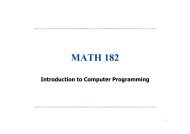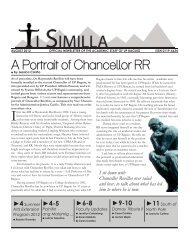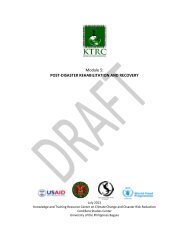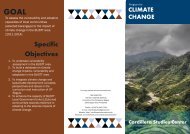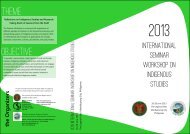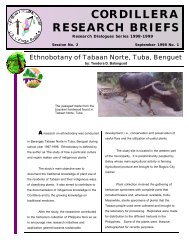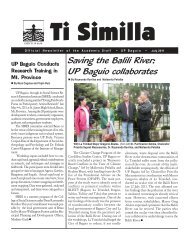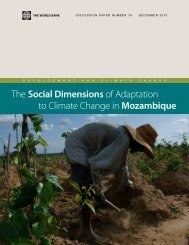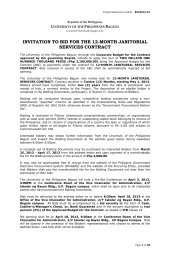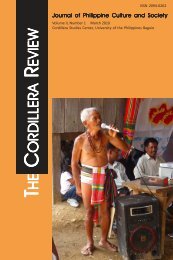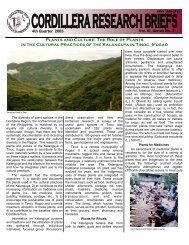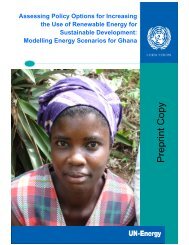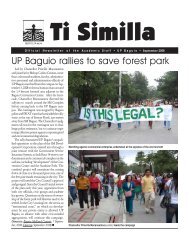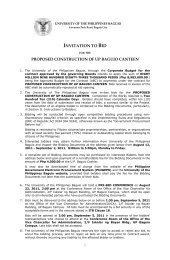Research Brief June 2003 - Cordillera Studies Center - UP Baguio
Research Brief June 2003 - Cordillera Studies Center - UP Baguio
Research Brief June 2003 - Cordillera Studies Center - UP Baguio
- No tags were found...
Create successful ePaper yourself
Turn your PDF publications into a flip-book with our unique Google optimized e-Paper software.
ISSN 1656-2151<strong>June</strong> <strong>2003</strong> Vol. VI, Series No. 1<strong>Research</strong> on the <strong>Cordillera</strong> at <strong>UP</strong> <strong>Baguio</strong>:The <strong>Cordillera</strong> <strong>Studies</strong> <strong>Center</strong> Turns 23The <strong>Cordillera</strong> <strong>Studies</strong> <strong>Center</strong> hadits beginning as the researchcomponent of the Development <strong>Studies</strong>Program of the then Division of SocialSciences. The M.A. Social andDevelopment <strong>Studies</strong> was theProgram’s curricular component.Among the key concepts underlyingthe operations of the <strong>Center</strong> were:a. A multi-disciplinary perspective that willguide the research agenda;b. The close linkage with local communities toprovide the critical anchor that will enablethe <strong>Center</strong> to tackle social issues confrontingthe Region, and;c. A vision of social science practice relevant tothe process of social transformation.ITS ESTABLISHMENTOn <strong>June</strong> 26, 1980 the Board ofRegents of the University of thePhilippines, in its 928th meeting,established the <strong>Cordillera</strong> <strong>Studies</strong><strong>Center</strong> “as the research and extensionarm of the Division of Social Sciences.”The <strong>Center</strong>’s objectives, as reexpressedin 1993 are:• To provide a venue for the exercise of thefaculty mandate to do research andextension;• To contribute to internal facultydevelopment;• To encourage collaborative and multidisciplinaryresearch;• To encourage attention to developmentissues with special focus on the needs andpotentials of <strong>Cordillera</strong> communities; and• To promote a continuing dialogue amongacademics, social science practitioners,government officials and communitiesSo from 1980 until 1998, the <strong>Center</strong>undertook its activities to fulfill thismandate.THE CSC AS RESEARCH ANDEXTENSION ARM OF THEDIVISION OF SOCIAL SCIENCESDuring this period the <strong>Center</strong>, as aninterdisciplinary research institution,focused on the development issues inthe uplands relying mainly on themembers of the Division of SocialSciences for its research personnel.Faculty from the Divisions of NaturalSciences, Humanities, SPEAR (Sports,Physical Education and Recreation),Management Sciences, and (the then)<strong>UP</strong>CB High School, were likewise tappedfor specific researches.In its first ten years, the <strong>Center</strong>primarily drew financial support from theFord Foundation through three grants onAgroecosystems research: 1981-83,1984-87 and 1987-1990. Through thesegrants, the <strong>Center</strong> established a stronglink with the Southeast Asian UniversitiesAgroecosystems Network (SUAN) beingone of the Network’s founding members.In 1988, grant funds from the AsiaFoundation augmented the Fordresearch funds for a project on “Issueson <strong>Cordillera</strong> Autonomy.” This projectgave birth to a continuing researchtheme on Governance and Public Policy.A grant from the Department ofAgriculture (DA) for a Land Tenure Studyfollowed. Then two grants from theNational Economic and DevelopmentAuthority (NEDA), Region 1 forPopulation, Resources and Environment(Phase I and Phase II) initiated theresearch program on Environment andResources.In 1990, the Food and AgricultureOrganization (FA0) supported theresearch project entitled “IbaloyCustomary Law.”By the second decade, the <strong>Center</strong>embarked on a research program onNatural Resource Management withfunds provided by the InternationalDevelopment <strong>Research</strong> Centre (IDRC) ofCanada. These are Natural ResourceManagement Program (or NRMP) 1,1992-1994, and NRMP 2, 1997-2001.Alongside these larger programs,smaller research studies were conductedon economic, political and socialinstitutions of local communities,indigenous knowledge and world views,local history, health, women and genderissues.Even while the <strong>Center</strong> undertookfunded research on social science issuesin upland development, individual facultyinterests on research on the <strong>Cordillera</strong>flourished, in particular, among facultyresearchers from the Natural Sciencesand Mathematics Division.<strong>Research</strong> on the <strong>Cordillera</strong> at <strong>UP</strong><strong>Baguio</strong> obtained a boost in 1995. The<strong>Cordillera</strong> <strong>Studies</strong> Program (CSP), withfunding support from the University ofthe Philippines <strong>Center</strong> for Integrative andDevelopment <strong>Studies</strong> (<strong>UP</strong>CIDS), wasestablished. During the CSP’s first twoyears, research was undertaken underthree components: Environmental<strong>Studies</strong>, Cultural <strong>Studies</strong> andDevelopment <strong>Studies</strong>.A COLLEGE RESEARCH CENTERThe experience of <strong>UP</strong> <strong>Baguio</strong> withthe conduct of the <strong>Cordillera</strong> <strong>Studies</strong>Program contributed to a clearrecognition of a need for a College-levelstructure to direct and coordinate intercollegeresearch programs. ThisCollege-level mechanism would give fullattention to strengthening the researchand publications program of the fiveacademic divisions of the College. Inrecognition of the notable performance ofthe <strong>Center</strong>, it was deemed appropriate torecommend that the CSC betransformed into the College <strong>Research</strong><strong>Center</strong>. Hence, on March 18, 1997, theCollege Assembly unanimouslyendorsed this proposal. The <strong>Center</strong>began operating as the College<strong>Research</strong> <strong>Center</strong> in <strong>June</strong> 1998.To mark this significant change, the<strong>Center</strong> launched the <strong>Research</strong> DialogueSeries in AY 1998-1999 with eightmonthly sessions. This was followed inAY 1999-2000 by seven round tablecontinued next page
discussions on the following themes:Local History and Institutions;Governance and Public Policy;Indigenous Knowledge, Philosophy andWorld Views; Environment andResources—Social Science Issues;Living Traditions—Art, Language,Literature and Communication andWomen and Gender <strong>Studies</strong>.PUBLICATIONSTogether with these researchprograms, the <strong>Center</strong> produces an arrayof materials for its publications program.To date, there are 14 monographs, 30working papers, 12 issue papers, a goodnumber of research reports andconference proceedings. In 1994, the<strong>Center</strong> expanded its publicationsprogram with the production of a popularversion of research findings in the CSC<strong>Research</strong> <strong>Brief</strong>s.LIBRARY SERVICESTo support research activities, the<strong>Center</strong> runs the CSC Library, which isboth a research and special collectionlibrary for books, non-book materials,unpublished sources, maps,photographs and slides on <strong>Cordillera</strong>communities. The library holdings havesteadily accumulated into anincomparable collection of <strong>Cordillera</strong>ethnographic materials on developmentissues, economic change, socialtransformation and upland resourcemanagement. The library now servesas a <strong>Cordillera</strong> regional information,resource and referral center.CSC and ITS PARTNERSWhatever the <strong>Cordillera</strong> <strong>Studies</strong><strong>Center</strong> and the faculty of <strong>UP</strong> <strong>Baguio</strong>have achieved in the 23 years that haveso quickly passed is owed to thepartners of the CSC: The <strong>UP</strong> <strong>Baguio</strong>faculty, researchers and administration.Its research partners: DA, NEDA, DOH,PLAN International, DENR, BSU, CLSU,PESAM, now SECAM, to name several.The networks and linkages that havesupported our publications andinformation exchange: SUAN,HARRDEC, Environmental EducationNetwork, Philippine Social ScienceCouncil, Philippine Health SocialScience Association. The <strong>Research</strong>Affiliates from foreign universities whohave brought fresh perspectives to ourresearch work. The funding agencieswho have provided the materialresources to undertake the <strong>Center</strong>’svarious projects.Most importantly, the communitieswho have welcomed CSC researchersinto their homes and allowed them to‘intrude’ into their lives.Twenty-three years ago, there wasnot a single research institution in thisRegion dedicated to studying the<strong>Cordillera</strong>. This is no longer true today.The <strong>Center</strong> is the first among severalresearch groups focusing their attentionon <strong>Cordillera</strong> issues.LIBRARY ACQUISITIONS2001 Fellow Traveler: Essays on FilipinoCommunism/Patricio N. Abinales.2001 The Future in the Balance: Essays onGlobalization and Resistance/WaldenBello.2001 The Philippine Economy: Alternativesfor the 21 st Century/Dante B. Canlasand Shigeaki Fujisaki, editors.2001 Introductory Mathematical Economics/Rolando Danao.2001 Reflections of Sociology andPhilippine Society/Randolf S. David.2001 The Filipino Family/Belen Medina. –2 nd ed.2001 Power in the Village: Agrarian Reform,Rural Politics, Institutional Change andGlobalization/Horacio R. Morales, Jr.[et al.], editors.2001 The Moro Islamic Challenge:Constitutional Rethinking for theMindanao Peace Process/Soliman M.Santos, Jr.2001 The Communist Party of the Philippines1968-1993: A Story of Its Theory andPractice/Kathleen Weekley.2000 Manuvu Social Organization/Arsenio E.Manuel.1999 Causes of Poverty: Myths, Facts &Policies: A Philippine Study/Arsenio M.Balisacan and Shigeaki Fujisaki , editors.1999 The Origins of Metropolitan Manila: APolitical and Social Analysis/Manuel A.Caoli.1999 The Colonial Iron Horse: Railroads andRegional Development in the Philippines,1875-1935/Arturo G. Corpuz.1998 Images of State Power: Essays onPhilippine Politics from the Margins/Patricio N. Abinales.1998 The Philippines into the 21 st Century:Future Scenarios for Governance,Democracy and Development 1998-2025/Jose V. Abueva1997 An Economic History of the Philippines/O.D. Corpuz.1997 Democratization: PhilippinePerspectives/Felipe B. Miranda, editor.1997 Explorations in Social Theory andPhilippine Ethnography/Raul Pertierra.1996 Choice, Growth and Development:Emerging and Enduring Issues/Emmanuel S. De Dios and Raul V.Fabella, editors.1995 Pinatubo and The Politics of Lahar:Eruption and Aftermath/Kelvin S.Rodolfo.1994 Poverty, Urbanization andDevelopment Policy: A PhilippinePerspective/Arsenio M. Balisacan.1992 The Textiles of Southern Philippines:The Textile Traditions of the Bagobo,Mandaya and Bilaan from TheirBeginnings to the 1990s.1984 An Analysis of the Philippine EconomicCrisis/Emmanuel S. De Dios, editor.CORDILLERA RESEARCH BRIEFS is published QUARTERLY by the<strong>Cordillera</strong> <strong>Studies</strong> <strong>Center</strong> to disseminate its research activities andresults to a wider audience.For further information on this study, please contact:THE DIRECTOR<strong>Cordillera</strong> <strong>Studies</strong> <strong>Center</strong><strong>UP</strong> College <strong>Baguio</strong>2600 <strong>Baguio</strong> CityTel/Fax : (63) (74) 442-57-94Email: cordillerastudies@yahoo.comDirector: Lorelei C. MendozaUniversity <strong>Research</strong>ers: Alicia G. FolloscoMarion DifuntorumAccounting Clerk: Gloria Q. RodrigueraInformation Officer: Giovannie R. RualoClerk: Rouena B. Aguto©1997<strong>Cordillera</strong> <strong>Studies</strong> <strong>Center</strong>University of the Philippines <strong>Baguio</strong>All rights reserved. Published <strong>2003</strong>



